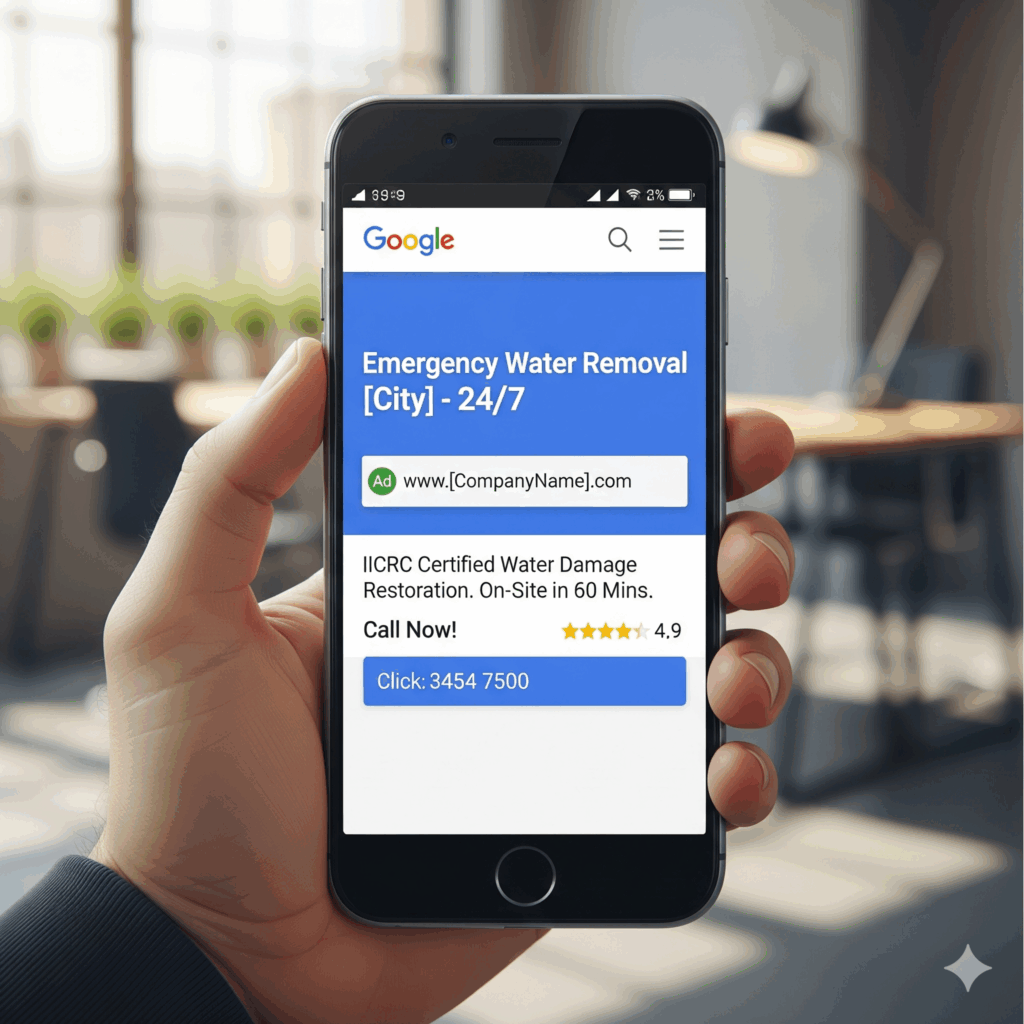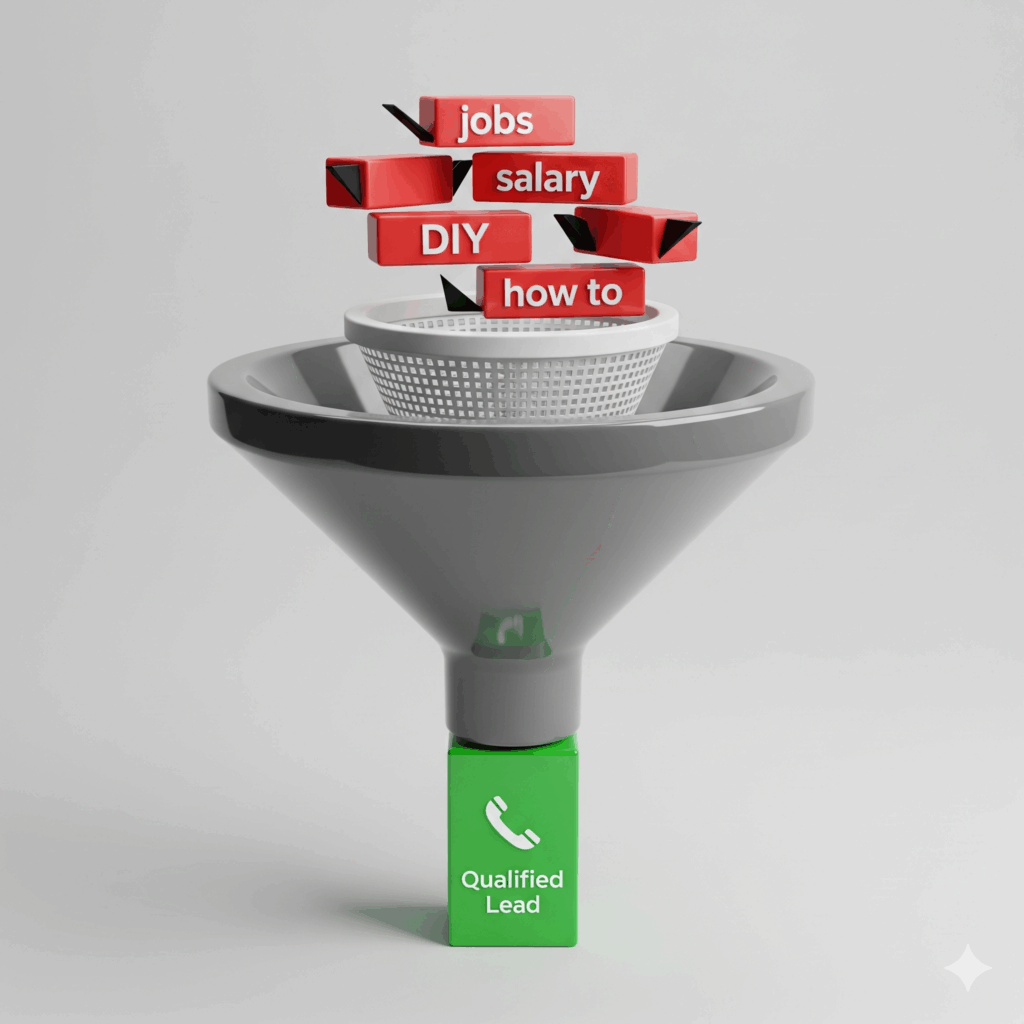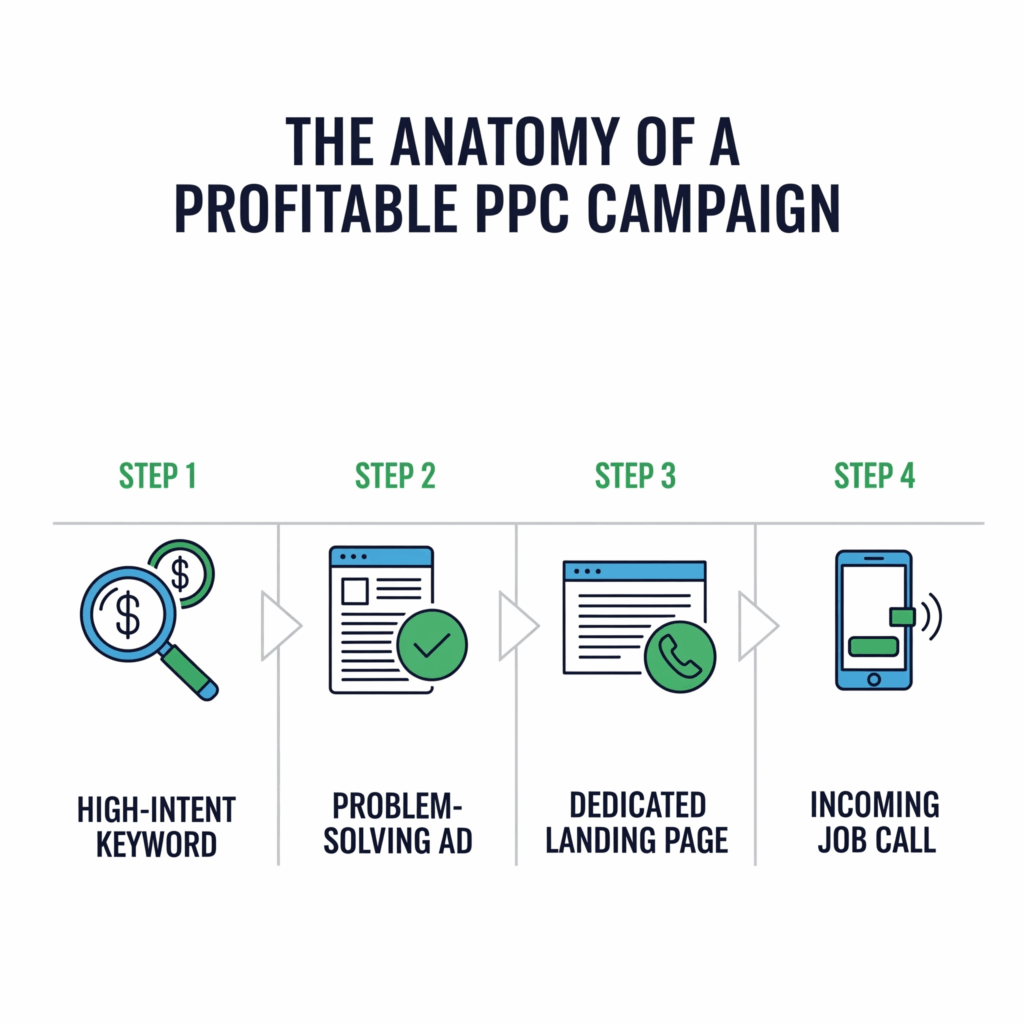The Google Ads Playbook for Restoration Contractors: Stop Wasting Money, Start Getting Jobs
TL;DR: Key Takeaways
| PPC Component | The Bottom Line for Profitability |
|---|---|
| Campaign Structure | Isolate each service (Water, Fire, Mold) into its own campaign and ad group. Lumping services together destroys relevance and wastes money. |
| Keyword Strategy | Stick to Phrase and Exact Match keywords for emergency services. Use a robust negative keyword list to filter out job seekers, DIYers, and irrelevant searches. |
| Ad Copy | Your ad must communicate speed, trust, and 24/7 availability in seconds. Focus on solving the searcher’s immediate, urgent problem. |
| Landing Page | Never send emergency traffic to your homepage. A dedicated, distraction-free landing page with a prominent click-to-call number is non-negotiable. |

For many restoration contractors, Google Ads feels like a cash furnace. You pour money in, and it seems to vanish into thin air with little to show for it besides a handful of irrelevant clicks and a massive bill. The platform’s complexity can be intimidating, but when managed correctly, it is one of the most powerful and scalable tools for generating high-intent, emergency job leads.
This is not a theoretical guide; this is a tactical playbook. As a specialist in restoration Google Ads, I’m going to walk you through the exact structure and strategy required to turn your PPC campaigns from a money pit into a profitable job machine.
The Foundational Mindset: Intent is Everything
Before you even open your Google Ads account, you must understand the single most important principle of search advertising: **intent**. The person searching “how to fix a leaky faucet washer” has low commercial intent. The person searching “emergency water damage company near me” at 2:00 AM has the highest possible commercial intent. Your entire campaign must be obsessively focused on capturing only that second type of searcher.
Campaign Structure: The Blueprint for Success
A profitable campaign starts with a clean, logical structure. Lumping all your services and keywords into one campaign is the number one mistake contractors make.
One Service, One Ad Group
You must isolate each core service into its own campaign and, within that, its own tightly-themed ad group. For example:
- Campaign 1: Water Mitigation
- Ad Group 1a: Emergency Water Damage
- Ad Group 1b: Sewage Cleanup
- Campaign 2: Fire Restoration
- Ad Group 2a: Smoke Damage Cleanup
- Ad Group 2b: Soot Removal
This structure ensures that someone searching for “sewage cleanup” sees an ad specifically about sewage cleanup, which dramatically increases your relevance and click-through rate.
Geo-Targeting: Your Digital Service Area
Target only the specific ZIP codes, cities, or counties you actually service. In your location settings, choose the option for “Presence: People in or regularly in your targeted locations.” This prevents you from paying for clicks from people hundreds of miles away who are just searching about your area.
Ad Scheduling: Own the After-Hours Emergency
Water damage doesn’t sleep, and neither should your ads. Run your emergency campaigns 24/7. More importantly, use bid adjustments to increase your bids by 20-30% during late-night hours (e.g., 10 PM to 6 AM). This is when your competition might be turning their ads off, creating a massive opportunity for you to capture highly motivated, desperate customers.
Keyword Strategy: The Fuel for Your Engine
Your keyword strategy determines who sees your ads. Precision is the key to profitability.
Match Types Explained (The Only Two You Need)
For emergency services, you should almost exclusively use **Phrase Match** (e.g., “water damage cleanup”) and **Exact Match** (e.g., [emergency water removal]). Avoid Broad Match keywords, as they will trigger your ads for all sorts of irrelevant searches and drain your budget.

The Ultimate Negative Keyword List
Negative keywords are just as important as the keywords you target. They prevent your ad from showing on irrelevant searches. Every restoration campaign should have a robust negative keyword list from day one. Here are some essential categories:
| Category | Example Negative Keywords |
|---|---|
| DIY / Informational | -how to -diy -pictures -video -what is -tutorial |
| Career / Job Seekers | -jobs -hiring -career -salary -training -school |
| Unrelated Services | -carpet cleaning -pressure washing -car -bottle -damage waiver |
Ad Copy That Converts in a Crisis
When a pipe bursts, the customer isn’t looking for a clever brand message. They are looking for a fast, trustworthy solution. Your ad copy must communicate speed and credibility in seconds.
The Anatomy of a Killer Restoration Ad:
- Headline 1: Service + Location (e.g., Emergency Water Removal Bloomsburg)
- Headline 2: Differentiator + Urgency (e.g., 24/7 Service – On-Site in 60 Mins)
- Headline 3: Trust Signal (e.g., IICRC Certified & Insured)
- Description: Reiterate the key points and add a strong call to action: “Call Now For Immediate Dispatch. We Work With All Insurance. Get a Free Estimate.”
The High-Converting Landing Page
Sending high-intent, expensive ad traffic to your homepage is one of the most common and costly mistakes. Your homepage is full of distractions (navigation links, other services, blog posts). You need a dedicated, distraction-free landing page for your PPC campaigns with one goal: get the call.
Non-negotiable elements for a restoration landing page:
- A large, click-to-call phone number at the very top of the page (“above the fold”).
- A simple contact form with only the most essential fields (Name, Phone, Service Needed).
- Prominent trust badges (IICRC, BBB, 5-Star Google Rating).
- 2-3 powerful, real customer testimonials.
- NO main navigation menu to distract the visitor from calling.
While Google Ads is designed to capture active searchers, the trust you build through other channels, like the ones discussed in our guide to building a referral system, can increase the chances a user will click your ad over a competitor’s.
You can also leverage remarketing to show ads to people who have recently visited your website on platforms like Facebook, which requires its own dedicated social media strategy to be effective.
Start Now — Fill Out our Intake Form
Questions First? Call/Text (570) 634-5885 • justin@realtimeleadgen.com
P.S. Google Ads is a powerful tool, but it’s a tool for experts. Following this playbook will put you ahead of 90% of your competitors who are still just burning cash.

Frequently Asked Questions About Google Ads for Restoration
How much should I budget for Google Ads?
A realistic starting budget for a competitive market is typically between $50 to $150 per day. The key is to have enough budget to get statistically significant data (at least 100 clicks) to determine what’s working. Starting with too small a budget is a common reason campaigns fail. The experts at Real Time Lead Gen can help you determine the right budget for your specific market and goals.
What’s a good Cost Per Lead (CPL) for water damage leads?
The Cost Per Lead (CPL) for water damage jobs can vary widely based on your city and competition, but it often ranges from $150 to $400+ for a qualified, exclusive phone call. While this may seem high, the high average ticket price of a water mitigation job can make this CPL extremely profitable if your closing rate is strong.
Should I use Google’s “Performance Max” campaigns?
For emergency restoration services, it’s best to start with a standard Search campaign where you have maximum control over keywords and targeting. Performance Max (PMax) is a highly automated campaign type that can work well, but it gives you very little control and can spend your budget on lower-intent placements like the Display Network. Master Search first before experimenting with PMax.
How long does it take for Google Ads to start working?
Unlike SEO, Google Ads can start generating calls within hours of being activated. However, it typically takes 30-90 days to fully optimize a campaign. This initial period is used to gather data, build up your negative keyword list, test different ad copy, and refine your targeting for maximum profitability.
150 E 10th St
Bloomsburg, PA 17815
(570) 634-5885
justin@realtimeleadgen.com

Justin Hess – Founder & Google Alchemist

